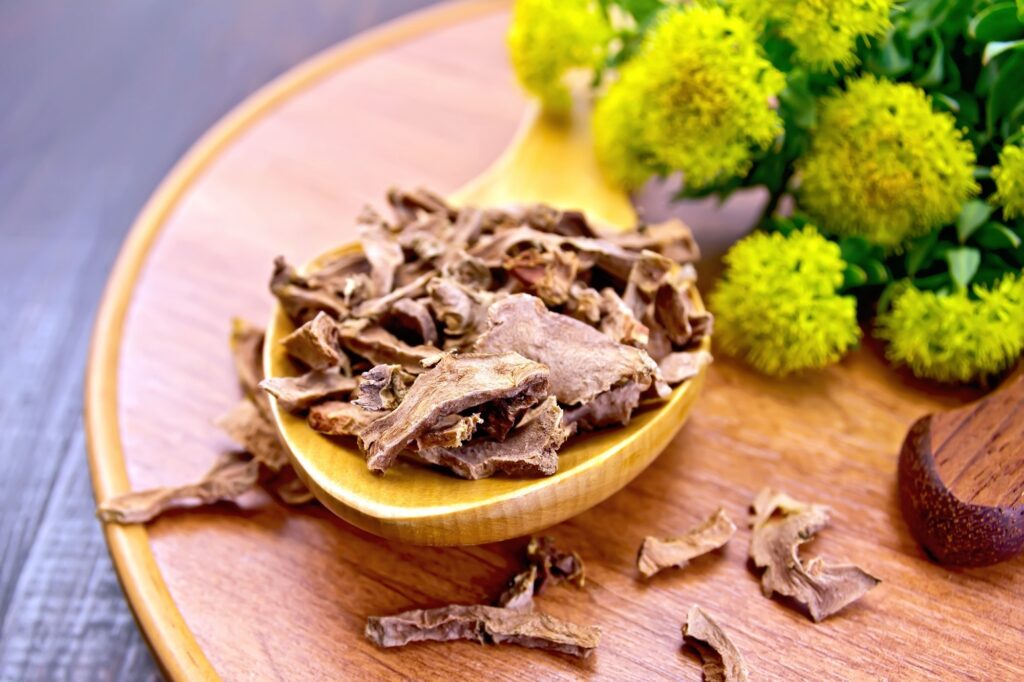
Rhodiola rosea, an adaptogenic herb with a storied history of medicinal use, is gaining attention for its potential to reduce stress, combat fatigue, and enhance cognitive and physical performance. Revered for centuries in traditional medicine, this “golden root” is now being scrutinized through the lens of modern science, revealing a complex profile of benefits and challenges.
Commonly known as ‘golden root’ or ‘Arctic root,’ Rhodiola rosea has been utilized in various traditional medicine systems, including Russian, Scandinavian, and Traditional Chinese Medicine. Its applications range from enhancing stamina to alleviating physical and mental fatigue. As interest in natural remedies grows, Rhodiola’s potential is being explored in contemporary wellness practices.
Botanical Background and Traditional Uses
Rhodiola rosea is a hardy herb that thrives in cold, mountainous regions such as Siberia, the Himalayas, and northern Europe. For millennia, it has been employed to treat fatigue, anxiety, and altitude sickness. The herb’s adaptogenic properties are attributed to compounds like rosavins and salidroside, which are believed to normalize stress responses and offer antioxidant and neuroprotective effects.
Standardized extracts of Rhodiola typically contain at least 3% rosavins and 1% salidroside. These compounds are central to Rhodiola’s effectiveness, ensuring consistency across different products. Despite its traditional roots, Rhodiola’s journey into modern medicine is supported by emerging scientific evidence.
Mechanisms of Action
Rhodiola’s primary mechanism involves modulating the hypothalamic-pituitary-adrenal (HPA) axis, which regulates stress hormone levels, including cortisol. By reducing elevated cortisol levels, Rhodiola helps maintain a balanced stress response, promoting the body’s return to homeostasis.
Additionally, Rhodiola enhances neurotransmitter activity, including serotonin, dopamine, and norepinephrine, which may contribute to its mood-lifting effects and improvements in focus and energy. Its antioxidant and anti-inflammatory properties further protect against cellular damage from oxidative stress.
Scientific Evidence of Health Benefits
Stress and Fatigue Reduction
Clinical trials highlight Rhodiola’s efficacy in reducing stress and fatigue. A randomized controlled trial involving 60 patients with stress-related fatigue found that those consuming 576 mg/day of Rhodiola extract experienced a 30% reduction in fatigue symptoms after four weeks compared to placebo. Similar benefits were observed among nursing students during exams, where Rhodiola improved alertness and exam performance.
In a study of over 1,100 participants, Rhodiola significantly reduced stress-associated symptoms like irritability and exhaustion within three days, indicating a rapid onset of action.
Cognitive Function
Rhodiola’s impact on cognitive performance is notable, particularly under stress. A placebo-controlled trial with 161 military cadets under sleep deprivation reported improved reaction time, accuracy, and memory recall. Night-shift physicians also experienced enhancements in associative thinking and short-term memory with Rhodiola supplementation.
Mood and Anxiety
Though research is limited, studies suggest Rhodiola may improve mood and alleviate anxiety symptoms. In a six-week study of individuals with mild-to-moderate depression, Rhodiola extract led to significant mood improvements and reduced insomnia, with fewer side effects than sertraline, a common antidepressant.
Another study found that Rhodiola improved well-being and reduced anxiety in participants experiencing occupational stress, though its effects were more pronounced in mild cases.
Physical Performance and Endurance
Historically used by Siberian hunters and athletes, Rhodiola’s performance-enhancing effects are supported by modern research. A double-blind crossover trial demonstrated that a single Rhodiola dose improved endurance exercise performance and reduced perceived exertion in young adults.
Elite rowers taking Rhodiola supplements reported lower lactate levels post-exercise, indicating improved recovery and reduced fatigue.
Safety, Dosage, and Side Effects
Rhodiola is generally safe for short-term use, with effective doses ranging from 200 to 600 mg/day of standardized extract. Side effects, when reported, are mild and include dry mouth and dizziness. However, Rhodiola is not recommended for pregnant or breastfeeding individuals due to limited safety data.
As Rhodiola is not a regulated substance, product quality can vary. Consumers are advised to purchase from reputable brands that undergo third-party testing and consult healthcare professionals before use, especially when combining with other medications.
Limitations and Areas for Further Research
Despite promising findings, Rhodiola research faces limitations, including small sample sizes, short study durations, and methodological weaknesses. Outcomes can vary based on extract specifics and population differences.
Significant knowledge gaps remain, particularly regarding long-term effects and use in diverse populations. Larger-scale trials are necessary to confirm Rhodiola’s role in treating chronic conditions like fatigue and anxiety disorders.
Conclusions
Rhodiola rosea emerges as a valuable adaptogen, supporting stress resilience and reducing fatigue by modulating the HPA axis and enhancing neurotransmitter activity. Clinical and observational studies underscore its potential in improving cognitive performance, mood, and physical endurance, particularly in high-stress environments.
However, caution is advised due to product variability and limited long-term data. As interest in herbal adaptogens grows, standardized, evidence-based approaches will be crucial. Individuals considering Rhodiola should consult healthcare professionals and choose high-quality formulations.





